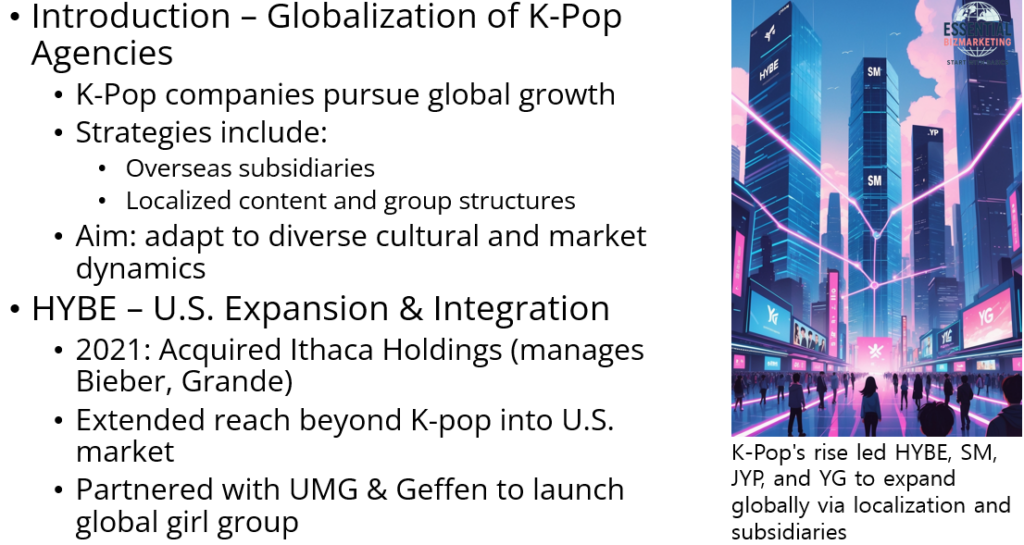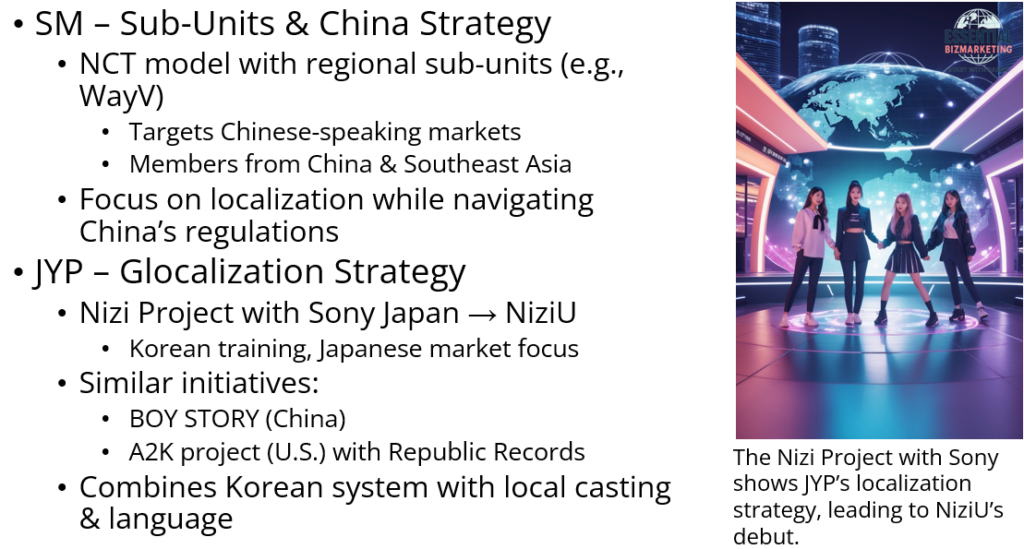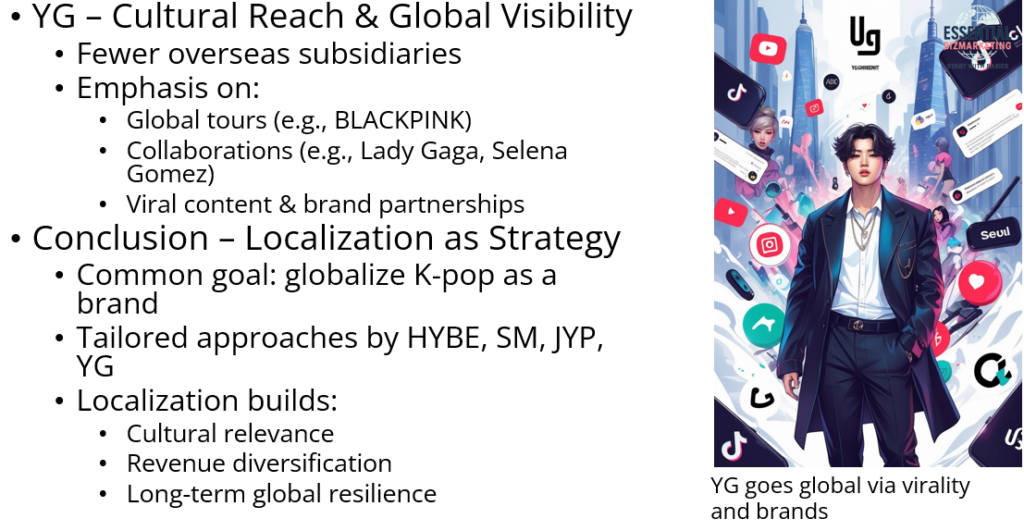Introduction: The Globalization of K-Pop Agencies

As K-Pop has evolved into a global cultural movement, South Korea’s leading entertainment companies—HYBE, SM Entertainment, JYP Entertainment, and YG Entertainment—have actively pursued international expansion through the establishment of overseas subsidiaries and localized strategies. These efforts reflect not only economic ambition but also a calculated approach to adapt to diverse cultural and market dynamics.
HYBE Corporation: Strategic Integration and U.S. Subsidiary Expansion
HYBE Corporation has aggressively pursued global expansion, particularly in the United States. In 2021, HYBE acquired Ithaca Holdings, a U.S.-based media company managing artists like Justin Bieber and Ariana Grande. This acquisition extended HYBE’s portfolio beyond K-pop and embedded the company in the American music industry. HYBE also partnered with Universal Music Group and Geffen Records to launch a global girl group, signaling a new phase of Western market engagement through hybrid cultural collaboration.
SM Entertainment: Localized Sub-Units and China Strategy

SM Entertainment has executed a long-standing localization strategy by creating sub-units of its groups to target specific regions. NCT, one of SM’s flagship groups, consists of multiple sub-units, including WayV, designed to cater to Chinese-speaking audiences. This group, composed primarily of Chinese and Southeast Asian members, demonstrates SM’s intent to engage local fandoms while navigating regulatory challenges in Greater China.
JYP Entertainment: ‘Glocalization’ Through Domestic Training and Local Casting
JYP Entertainment’s “globalization by localization” strategy is best illustrated through the Nizi Project, a strategic alliance with Sony Music Japan that resulted in the debut of Japanese girl group NiziU. The group was trained under JYP’s Korean-style idol system but targeted at the Japanese market. JYP has applied similar models elsewhere, including its Chinese boy group BOY STORY and the A2K project in partnership with Republic Records in the U.S. This systematic approach blends Korean training methods with local language, culture, and members.
YG Entertainment: Cultural Leverage and Global Visibility

While YG Entertainment has fewer formally announced foreign subsidiaries, it focuses on global exposure through its artists and partnerships. BLACKPINK, for instance, has collaborated with Western artists such as Lady Gaga and Selena Gomez and held worldwide tours that reinforce YG’s visibility across the Americas, Europe, and Southeast Asia. YG’s strategy emphasizes content virality and brand collaborations to maintain global relevance without extensive overseas infrastructure.
Conclusion: Localization as a Competitive Advantage
The global expansion strategies of HYBE, SM, JYP, and YG highlight a common vision of K-pop as a worldwide brand. By tailoring group structures, content delivery, and marketing approaches to local cultures, these companies not only secure international revenue streams but also contribute to the cultural hybridity that defines modern pop music. Their localized approaches, while varied, collectively enhance K-pop’s resilience and longevity in an increasingly competitive global entertainment landscape.
📚 References
Hankyoreh. (2023, July 19). Local talent, global goals: K-pop agencies look to “glocalize” the genre. Retrieved March 25, 2025, from https://english.hani.co.kr/arti/english_edition/e_entertainment/1100886.html
Korea Herald. (2018, April 23). K-pop industry aims for a bigger piece of pie through ‘glocalization’. Retrieved March 25, 2025, from https://www.koreaherald.com/view.php?ud=20180423000862
Korea Times. (2023, August 17). JYP Entertainment’s Chinese boy group eyes success in Korea. Retrieved March 25, 2025, from https://www.koreatimes.co.kr/www/art/2025/01/398_355925.html
Universal Music Group. (2024, March 26). HYBE and Universal Music Group announce new global alliance. Retrieved March 25, 2025, from https://www.universalmusic.com/hybe-and-universal-music-group-announce-new-global-alliance/
Wikipedia contributors. (n.d.). HYBE Corporation. Retrieved March 25, 2025, from https://en.wikipedia.org/wiki/Hybe_Corporation
Wikipedia contributors. (n.d.). JYP Entertainment. Retrieved March 25, 2025, from https://en.wikipedia.org/wiki/JYP_Entertainment
Wikipedia contributors. (n.d.). SM Entertainment. Retrieved March 25, 2025, from https://en.wikipedia.org/wiki/SM_Entertainment
Wikipedia contributors. (n.d.). YG Entertainment. Retrieved March 25, 2025, from https://en.wikipedia.org/wiki/YG_Entertainment
📁 Start exploring the Blog
📘 Or learn more About this site
🧵 Or follow along on X (Twitter)
🔎 Looking for sharp perspectives on global trade and markets?
I recommend @GONOGO_Korea as a resource I trust and regularly learn from.
